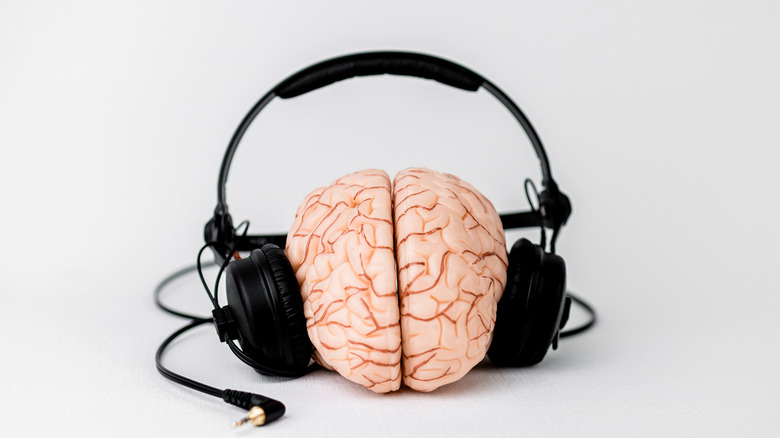Music That Can Actually Boost Your Brain Health
For anyone who is moved by music, it's probably not hard to believe that music can have positive effects on the brain and central nervous system. "Of course, it does!" you might be thinking to yourself as moments of your life flash before your eyes like a montage in an 80s movie — with your favorite song in the background of all of them. Perhaps you can remember a few times life felt overwhelming, but a certain song helped you breathe a little easier in the moment.
The power of music has been known by mankind for years, but now, science is on board, too. According to mindbodygreen, psychoacoustics is a fairly new branch of scientific study surrounding psychological responses to sound. Even though there's still much to be discovered, the field of study is expanding at a rapid pace, and many are looking at the ways music can positively affect our brains.
What can music do for your brain?
According to Johns Hopkins Medicine, listening to music is your brain's version of going to the gym — it can reduce anxiety, blood pressure, and physical pain while improving sleep quality, cognition, and memory. Because music is inherently very structured and mathematical, our brains are doing a lot of computing every time we turn on the radio.
Integrative neurologist Dr. Ilene Ruhoy told mindbodygreen that music might even be able to help with emotional processing. In some cases of post-traumatic stress disorder (PTSD), music might be able to elicit feelings that help people process buried emotions that are surreptitiously taking a toll on their neurological health.
Taking it a step further, a review was published in Brain, Behavior, and Immunity in 2014 that examined 63 relevant medical studies. The researchers concluded that music was able to better decrease blood pressure and cortisol levels than pharmaceutical anxiety medication.
What kind of music is best for your brain?
So what kind of music is the best medicine? According to Entrepreneur, it has less to do with what kind of music you listen to and more to do with the tempo of the music. Cognitive behavior therapist Dr. Emma Gray teamed up with Spotify to research the benefits different kinds of music have on the brain. She found that songs from any genre with 50-80 beats per minute were most likely to shift the brain into an "alpha" state. When the brain is in an alpha state, our brain waves slow down, which makes us feel more relaxed. Then, the part of the brain where imagination, memory, and intuition live becomes easier to access.
Music, of course, is subjective. Across the board, the consensus seems to be that you should find what works for you. If rock music eases your anxiety and smooth jazz gets you all worked up, listen to your body. Find something familiar with 50-80 beats per minute and see what that brain can do!



